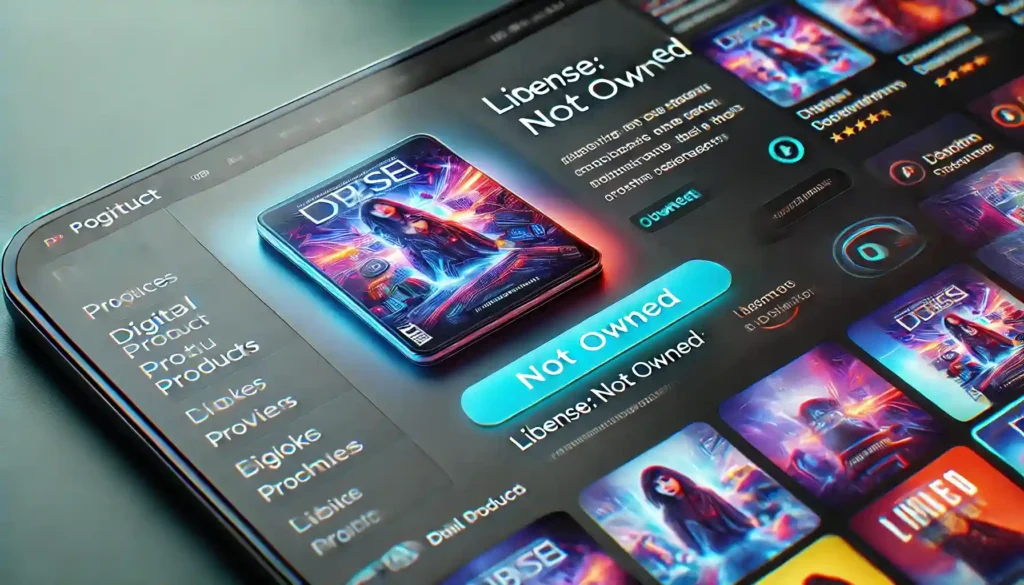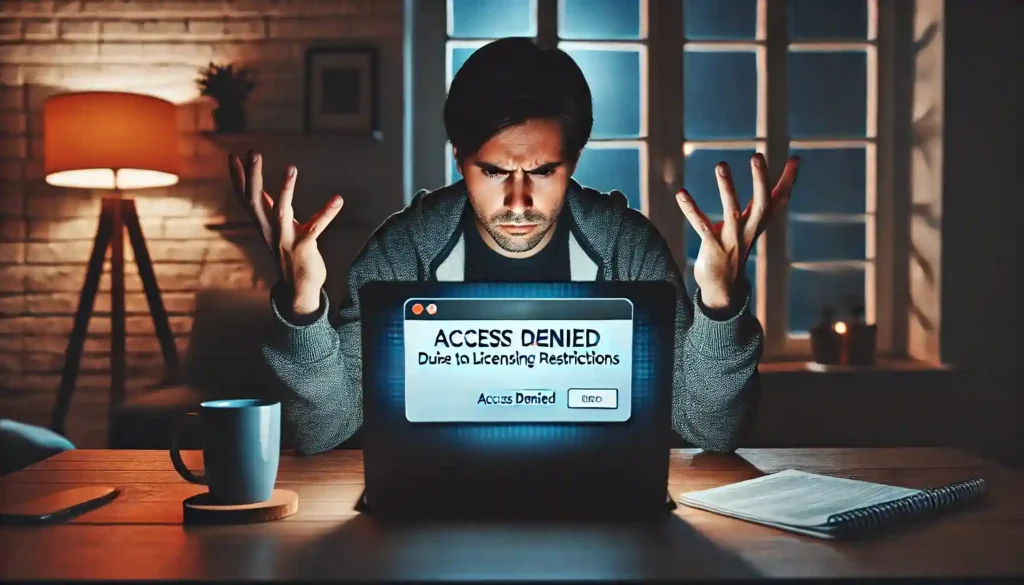Hello wonderful people! Do You Have Full Political Titles for What You Buy On-Demand in the Digital World? Indeed, the entire digital market is really coming alive with apps streaming, downloading, and creating e-libraries, allowing many of us to really get excited about the possibility of buying something for consumption in the digital arena. Movies, music, e-books, or video games-we get to pay to have the privilege of downloading them into our own machines-and maybe even streaming some more.
So this new law, which is coming into force in the year 2024, will require people operating digital shop fronts to present a big-bang reality: just because you buy something digitally, does not mean that you own it in the usual sense of the word. More often than not, the actual “ownership” is encumbered by the document that allows the reader to use the media under typically restricted conditions.
This is where we begin!
Digital Media’s Growth and the Ownership Myth

For the last 20 years, the shift from physical and carrier media to digital has almost totally reached its destination. It may never be physically transferred, whether it is CDs, DVDs, or even BLU-RAY formats. Most of the time in the present age, everyone loves watching movies or listening to music online through various sites like Netflix and Spotify or Amazon Prime that offer a rich catalogue of songs and movies readily available for an audience or viewer. One of the similar administrative body who works with such line of business is iTunes, Google Play, or even Steam to provide a consumer the opportunity to buy a single track, movie, or video game.
For most consumers, acquiring digital media is as easy as getting a CD: you buy, download, or stream your content and, voila, you have it forever. It’s just that simple, isn’t it? But it’s not.
Digital Purchases: What Do You Truly Own?
When one purchases a physical copy hard to obtain-a film to watch or a novel to read, one can enjoy the feeling of possessing something tangible and can put it into the palm of one’s hands-the material is yours, and under normal circumstances, nobody has the audacity to snatch it from you while you can watch it at your convenience, lend it to friends or sell it depending on what suits you best during that time.
However, what about digital content when it says: purchase? That does not mean that the file is now yours, for it is actually a payment for the exclusive access to the specified content according to the pre-stipulated terms and conditions. These licenses usually have some restrictions and limitation about what you could do with the content. Example:
There are no copies of digital purchases which are going to be sold again and no others will be allowed to it.
Delegates a right of termination for a user by the licensee to obtain access regarding the specified content.
In some cases, digital content might be disappearing from the user,’s library if, for example, the publisher loses the rights to publish it.
This broad gap between the consumer’s rights predominantly supposed to own things and the actual licensing terms has baffled the consumers and has emanated a lot of cries and controversies. This new California law will bail out the consumer from this quagmire.
California’s Law Reveals the Truth About Digital Ownership
It will soon be a statutory requirement, starting in 2024, for each and every digital seller doing business within the state boundaries of California to provide mandatory and easily understandable disclosures to purchasers of digital goods. These disclosures will make it very clear to a consumer that they do not really “own” the content in the traditional sense but instead purchase limited rights associated with it.

The object of this statute is to increase clarity and understanding, besides making the consumers aware of any restriction attached to their purchase of digital items, if any. Some of the most important elements of this new law are as follows:
Notices Required
Digital retail will have a place within conspicuous notices on product pages saying all purchases of digital media are not purchases but licences for the media. Consumers will then not buy any digital content, thinking that they own it completely.
Particulars about Licensing Issues
Both online and offline retailers must now inform customers about the licensing that comes with purchased content, including the restrictions such as how long the consumer has access, whether anything can be given, sold, or lent to anyone else, and in what cases access will be reinstated.
Guaranteeing Containing the Refund and Access
These stores will have to refund or have a solution to the problem by making the content available elsewhere or in another suite of services when there would be withdrawal or means of restricting access to the digital content already bought.
How It Affects Consumers
The law wants to protect good consumer interests by making online businesses more transparent and accountable. Many such cases left huge surprise after they found that they could not access some form of digital content or the worst would be reality-denied resale or transfer of copies legally bought. Now that is why California wants to go to this extent to prevent confusion and arguments in the future over such trivial matters.
This is what protection will be there for consumers-the challenge that will hold center stage in this instance. I will look into some elements of that law and how it will change ways of buying and consuming digital content.

Enhanced Clarity
A consumer will have a clearer picture of what he is purchasing when acquiring digital content. The consumer here is more free, in that he knows he is not buying an item forever but rather has a right to access that particular item.
Possible Changes in Pricing
Thus, there are expectations of reforming the pricing strategies regarding how consumers react to such kind of information. Consumers may not take to paying exorbitant prices for such digital goods, considering the fact that, in reality, the goods can be impounded after purchase. This might slow down prices or even induce the introduction of less rigid priced paying policies, for example, ‘pay once, and access that particular content for a lifetime’ kind of policy.
Consumer Safeguards
Among its many benefits, this legislation has such an aspect as great consumer protection. For example, it would refund the consumers or make any of the provisions available despite the access-missing delivery of such products purchased via digital avenues. But most of all, it puts a certain responsibility, absent in the context of the digital economy.
Broader Implications: Changing Views on Digital Ownership
Most likely, the law enacted in California will trigger a domino effect in other countries or states to follow suit. On the other hand, digital ownership problems are not unique to California since boundaries seem to exist to most people’s minds when it comes to purchasing electronically. It is most likely that similar calls for laws will appear in the other jurisdictions.

Furthermore, such a law will incite a deeper debate about “ownership” in our times. Considering that most people have most of their life-including entertainment and even work-becomes virtual; that could be a compelling reason to consider changing definitions of what it means to own in terms of today’s most prevalent modes of digital licensing.
The Future of Digital Media
Most probably, in the future, digital portals may have flexible licensing policies to manage among customers who may be demanding in having more control over their purchases. Take for example:
- It is plausible that lifetime license may be on the rise, which may give one the possibility of availing indefinite access to any digital purchase despite the current status of the distribution rights of a platform.
- Transferable license allows users to share their digital console content among other users by passing it to family or friends.
- These different forms of ownership, including digital assets called collectible assets (NFTs), may give consumers even more advanced methods of buying, selling, and trading digital media anywhere and at any time without using restrictions.
Conclusion
Indeed, this new Californian law marks a significant landmark concerning dynamics as far as digital media is concerned. It obliges the digital marketplaces to disclose what a digital purchase actually means: consumers are protected from the dark side of making acquisitions they do not appreciate knowing.
This law doesn’t, in fact, change any existing controlling principle as to how digital goods are bought, sold and dealt with; but it IS on the right track to increasing consumer protection.
And with this legislation comes a renewed debate on issues regarding digital ownership, licensing, and consumer rights as the economy goes digital. If you are one of those who have been buying digital services actively or merely interested with digital economy issues.
Was this article really helpful to you in knowing about California’s new law?
FAQs
- What are the new digital media ownership laws from California?
The future comes with California’s requirement that all digital sellers must start disclosing in page one of their purchase agreements in 2024 that purchases of digital media are licenses, not properties because restrictions will point to the content.
- How will this affect all digital purchases?
Consumers will get the clearer understanding that they are purchasing access, not ownership, and likely changes in the model underlying pricing and licensing of digital goods.
- What does this law do with respect to consumers’ protection?
It informs them of licensing terms such that if the particular content were withdrawn from access, the consumer would have access to get his dollars back or an alternative means of access, resulting in less confusion caused by digital purchases.
- How would this affect other regions of the world or even other countries?
The law in California can become a model to other states or even countries possibly igniting the fires of parallel legislating and stirring thoughts regarding ownership and licensing issues.




